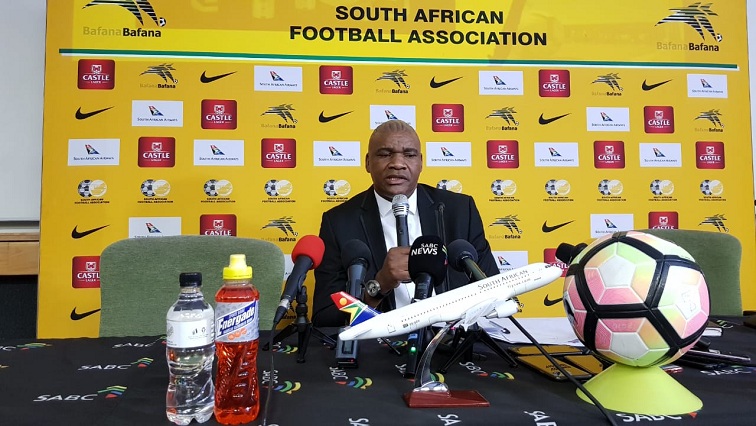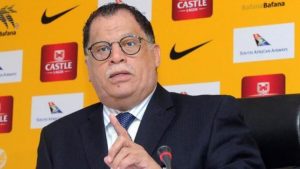As usual Bafana Bafana’s failure to qualify for the Africa Cup of Nations has drawn a lot of criticism and all sorts of prognosis about what could have engendered yet another miscarriage.
Amid the public furore, it was, however, difficult to come up with anything to say about this bunch of uhmmm … let’s leave that to Fikile Mbalula. It was difficult to come up with anything to say about this bunch – the players, technical team and SAFA leadership – that has not already been said before.
It is, nonetheless, disconcerting, in view of the future of the national team, to listen to some of the diagnoses around the national team’s situation. These range from Bafana Bafana Coach Molefi Ntseki was the wrong man for the job, to the players are not hungry enough, the players are too short and frail and can’t compete against physical opposition and all sorts of decades-old claptrap, which is the actual reason why the national team in such a dreadful state.
We will try and steer away from repeating things that have already been said in this regard. We will also try to avoid repeating the story told by the trajectory of the national team’s performance since 1996 as Champions, 1998 Losing Finalist, 2000 Semifinalist, which consistently indicated a downward trend which would inevitably result in complete failure to compete at all on the continental level if not attended to, which is where we are currently.
But it is horrifying that after all these decades the coach is still being seen as the reason for Bafana Bafana’s woes. Very elementary mistakes are being made in this diagnosis.
Firstly, before you put blame of any sort on Ntseki one is ought to ask, in what state did Ntseki find this team? If Bafana Bafana had at least been Afcon regulars, then perhaps you could fault Ntseki. But over the past 11 years, there have been five biennial tournaments, of which Bafana Bafana qualified for only three. And of those three, one was through the back door with an automatic qualification after Caf’s last-minute decision to award South Africa rights to host the 2013 Afcon tournament. Two years later, in 2015, the team qualified and two years later in 2017 Bafana failed to make the cut again. They made a comeback in 2019 and then 2021 has come and we are here! So, Ntseki has done nothing out of the ordinary with regard to this team’s fortunes.
To blame him is wrong on many levels. That is mischievously assuming that Ntseki was the messiah that the national team was waiting for, far more qualified and capacitated than Clive Barker, Phillipe Trousier, Trott Moloto, Jomo Sono, Styles Phumo, Carlos Queiroz, Ted Dumitru, Pitso Mosimane, Carlos Alberto Parreira, Joel Santana and Gordon Igesund – with some having had more than one chance with the national team. To think the national team was, all these years, waiting for Ntseki to rescue it is utterly exaggerating Ntseki’s importance, who when he was appointed many didn’t know who he was and, to this day, still ask how he got to be appointed in the first place.
Attempting a search for the name Molefi Ntseki on Google, the search reveals the most asked question is, “Where is Molefi Ntseki from?” So, go figure!
Word in Safa’s corridors has it, when Ntseki was appointed Safa could not afford another foreign coach to succeed Baxter and appointing him on a permanent basis was more an economical decision than anything else. And looking at his track record and the nature of coaches the association afforded when its bank accounts were booming the rumour makes perfect sense. But that is a topic for another day.
Ntseki makes the situation worse by taking responsibility for Bafana’s failure. That is noble, but it takes the attention away from the real truth. Winning tournaments in football have proven over decades that it is not an event, but a culmination of years of preparation with a clear, consistent and relevant technical vision. You don’t have to go far in trying to understand if the idea of consistent technical vision is consistent with Safa. There are very few football ideological similarities in most of the coaches that have exchanged the Bafana coaching hot seat over the years. No consistency! Even after Safa’s 2014 launch of its much-publicised Vision 2022, there are huge ideological differences in the understanding and approach to the game by the coaches hired since then – Shakes Mashaba, Stuart Baxter and Molefi Ntseki – proving that Vision 2022 was a blurred vision with the national team currently sitting in position 71 on the Fifa Rankings when it was envisaged in that document that by next year the national team would be “in the top 3 of the African rankings, and in the top 20 of the World rankings.” It was also envisioned that in next year’s Fifa World Cup Bafana would for the first time go beyond the Group Stages of the tournament, but how so when it is clear that there won’t be any trip to Qatar unless it will be to watch and learn?
So, noble as it is for Ntseki to take responsibility for Bafana’s failure, it is not his fault. It is as a result of years of smoky Vision 2022.
In his 2013 article: How Germany went from bust to boom on the talent production line, published in The Guardian, Stuart James, writes: “German football is booming, reaping the rewards of the strategy drawn up after their dismal performances at Euro 2000 when Germany finished bottom of their group. Forced into an overhaul of youth football, the DFB, the Bundesliga and the clubs decided that the development of more technically proficient homegrown players would be in everyone’s best interests. This led to the creation of academies right across the top two divisions.”
This is evidence that Bafana’s problems are bigger than Ntseki and he has no responsibility to shoulder in this regard. This also shows it is high time the country stopped putting the blame on coaches, selection, starting lineups, substitutes, and all simplistic analyses that overlook the urgent need for technical authority for Bafana’s woes.
During the 2017 Afcon tournament in Gabon, in a ‘Memo to Regions’ document titled: ‘Local development or Europe; which is the route to success?’, dated 26 January 2017, from the office of the Safa President, Danny Jordaan, the association, through its president, enters what it terms, “…endless debate on what is the foundation of having a strong senior national team in developing countries i.e. Africa, Asia and South America.”
SAFA argues in the document, “Fact is that the majority of the teams that got knocked out in the first round are those with the lowest number of players who play in Europe and the favorites to win the tournament Ghana and Senegal have the highest number of players from Europe in their squads. Both Uganda and Zimbabwe have 1 and 4 players in Europe, respectively.
On the other end, Guinea Bissau with no player from their own country or league qualified for Afcon 2017. This clearly shows that the qualification and performance of most of these countries is not necessarily a result of an internal domestic development plan or a strong domestic professional league but mostly by players who leave the country to play or are recruited on the basis of parents from the country of origin to Europe.”
MISGUIDED! While there may be some link to an extent between the number of players based in Europe and national team success based on the higher level of competitiveness at that level, that is not all there is to it. For players to move to Europe, to start with, need to be good enough to play in Europe. Now, how many players is South Africa producing to compete at that level? That is perhaps the question that needs to be addressed.
Beyond that, it is important to look at the foreign coaches and players’ influence in local leagues. On this point, it is important to point out that 100% of clubs in Italy had local coaches in the 2005-06 season when Italy went on to win the 2006 FIFA World Cup in Germany. 85% of clubs in Spain had local coaches when Spain won the World Cup in South Africa, and 72% of Bundesliga clubs had German coaches when Germany ran rampant in Brazil in 2014.
Those dynamics need to be looked at in the context of the situation in the PSL and Bafana’s ambitions. It is encouraging to see more and more clubs choosing to go local on their benches, which has not been the case for many years, but even with these the apparent positive winds of change on the PSL benches, it still remains problematic when there is no unitary football philosophy among the local coaches. How many of those local coaches represent foreign concepts much to the detriment of local talent? And the result of that will be reflected in the national team. These winds of change will further be undone when these local clubs themselves rely on foreign players for success. These are players who will win Caf Champions Leagues for local clubs, but are ineligible for national team call-ups. As it is, with the current situation there is a goalkeeper and striker crisis looming for Bafana Bafana with more and more clubs relying on foreign players in those departments – story for another day.
The players and coaches that continue to fail at an international level are a mere reflection of the quality of the player and coach development structures of Safa. It has nothing to do with lack of hunger or determination by the crop of players. Ntseki wants to win the World Cup and is hungry to win it, and so does Ronwen Williams, Themba Zwane, Percy Tau, Ben Motshwari, Lebohang Maboe, Thulani Hlatshwayo and all the players. They all want to win the World Cup. But none of them can perform beyond the quality of their preparations for those achievements.
At this point we should ask, do you still believe simplistically blaming Ntseki is the way to go; the starting lineups, the corner kick, the offside, the substitution, the referee, the linesman, a defensive error, a poor cross, a goal miss? Are those really issues handicapping the progress of the local game? Really? Come on…
– By Sipho ‘King K’ Kekana – SABC Digital News Senior Producer and Sports Analyst, @KingKAzania






